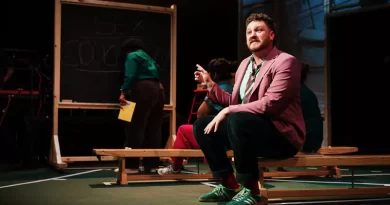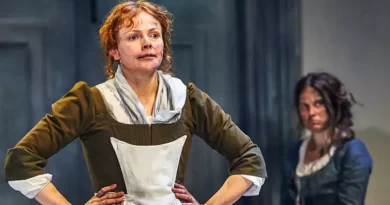“Oresteia”, Park Avenue Armory, New York
Glenda Frank in Manhattan
28 July 2022
Murder is how the characters in Robert Icke’s rewriting of Aeschylus’ Oresteia attempt to revive justice, balance out the past and restore harmony to their world. It is one of the more provocative themes in this slow, problematic and – in burst of lightning – brilliant work.

Foreground: Angus Wright, Tia Bannon, and Luke Treadaway.
Photo credit: Joan Marcus.
Orestes’ trial for matricide is the framework. The action unfolds as Orestes (Luke Treadaway) retells the story to an unnamed doctor (Kirsty Rider). As for sister Electra and Pylades, Orestes’ accomplices, well, that’s one of the more interesting script changes. Icke allows Klytemnestra (Anastasia Hille) strong feminist monologues, and the psychic Cassandra (Hara Yannas) gets a scream that crescendos into a heart-wrenching show-stopper.
The first three acts are both retrospective and set in present time. Costumes are a sleek, modernish business dress in black and white (set and costumes by Hildegard Bechtler). The fluid staging (Icke directs; Natasha Chivers, lighting design) on the large performance arena benefits the play as do the video interviews where the human-size characters are also giant talking heads. The inclusion of videos (Tim Reid, design) is an effective dramatic choice to emphasize the role of the House of Atreus in the community as well as a metaphor for our age of celebrity. Present and past worlds conflate. “This has all happened before,” says Calchas (Michael Abubakar), the seer. “And more than once.”
Icke’s Oresteia opens with a reconceived focus on the sacrifice of Iphigenia (Elyana Faith Randolph, Alexis Rae Forlenza on alternating nights), Orestes’ younger sister. The scene is adapted from the play by Euripides. Agamemnon (Angus Wright) has volunteered his daughter’s life in exchange for strong winds to lead the fleet to Troy, the enemy of the Greek confederation. Based on the prophecy that Calchas sells to the Greeks, Menelaus, Agamemnon’s brother, and the other generals vote unanimously for the girl’s death, claiming that one life will save thousands; that if the Greeks lose the war, the life of Agamemnon’s daughter will be worse than death.

Anastasia Hille and Luke Treadaway.
Photo credit: Joan Marcus.
The sophistry in this argument is chilling. An inflexible Calchas recites the names of gods: “Zeus, Allah, El, Jehovah, Janus, Jupiter, Jove.” He is a variation of the Greek chorus, reminding us of religious mandates. Photographs of the generals are laid out on the table. Iphigenia’s corpse is later placed on top of them. One of the most poignant refrains throughout the four scenes (and the 3 hours 40 minutes) is that the child is the price that must be paid.
In a remarkable twist, Icke has Klytemnestra, Iphigenia’s mother, know the plan. In a compelling scene, she sweet talks, then argues for her daughter’s life. Why doesn’t she run away? She raises and drops the thought. In the Euripides original, Klytemnestra is told that her daughter, an older Iphigenia, has been selected to marry the hero Achilles. She adorns the girl for her wedding, only to discover the ruse in the camp. Icke has transformed family betrayal to a powerful anti-war disquisition, evoking the draft of young man, war as a tool of greed, and the self-involvement and neglect of the young by an older, out-of-touch generation. The sterile tray with three small cups of sedatives and poison to speed the death seemed like an allusion to capital punishment. The reappearance of the tray signals a remarkable twist in the last act.
The sacrifice in the Oresteia generates a chain of murders, all of them justifiable, none palatable. The wind that rewards the bloodless slaughter scatters a storm of papers all over the stage. The orderly universe has been shattered. Between the acts to remind audiences to return after the intermissions – but also as a metaphor, an over-sized digital clock on stage keeps ticking. An electric zipper punctuates each murder by announcing the time of death to the second. A robotic Calchas conveys facts without feeling, details without human complexity. He is terrifying in his absoluteness.
The second act places us squarely in Aeschylus’ Agamemnon, the first play of the Oresteia trilogy, which won first prize in Athens. Klytemnestra declares that the war is won. Cassandra, now not a trophy, but a rescued Trojan victim brought home by Agamemnon, breaks her silences with powerful, gut-churning wails as her lines in a foreign tongue are gradually changed to be spoken in English.

Hara Yannas as Cassandra.
Photo credit: Joan Marcus.
Agamemnon, deflated by the ten years of fighting, wants a quiet return and a bath, not a red carpet. After his wife kills him while he is soaking (purging his sins?), she slowly drags his bloody corpse on a sheet from the discovery space to centre stage. She revels in the blood that covers her, explains how her gentle words of welcome had been lies. She can now be truthful: she enjoyed the murder; she wants to do it again. So much for repentance. Angus Wright is double cast as Aegisthus, her subservient lover, an ironic comment.
For a reason I have never quite fathomed, I have always much admired The Libation Bearers, the second act of Aeschylus’s trilogy, which is the third (very clever) act here. Electra (Tia Bannon), in total despair as she mourns her father, retreats to the cemetery (an open trap door) to honour him with a tribute of his favourite red wine. In the ancient text she is accompanied by a chorus of lamenting women. In Icke’s version she is alone. Both are poignant. Orestes is hidden. Separately, she and her brother discover a lock of hair like theirs and footprints identical to their own. The revelation of this mystery is one of Icke’s distinctive and provocative additions to the legend. At the house, Klytemnestra tells Orestes of her dream that he was a snake who suckled at her breast and then dug his fangs deep into the soft flesh.
In the final scene, the trial, Orestes’ sanity is questioned by the jury – and the audience – before a female god (a voice) breaks the tied vote. For Icke, Aeschylus’s Oresteia is not a battle between the old matriarchy and the rule of men, but about the undefended child. Even guilty, must the son die? Should the cycle of vengeance remain the precedent? The tragedy – the isolation of the hero – is transformed into the classic definition of a comedy, a society that is reformed and where the younger generation takes over and rules.
The performers are adept but the acting is angular, elbowing audience members to keep their distance. Angus Wright’s oratorical delivery works well for King Agamemnon. Cast against type, Anastasia Hille displays profound understanding of her role as Klytemnestra and adds continual surprise. I found the other performers less charismatic, less impressive. The whole was carried not by character but by plot and Icke’s innovations. The production is too talky and redundant, more cerebral than poignant, so the moments of intense emotion are most welcome. By virtue of the conflicts and refrains being established early on, the scenes unfold gracefully and metaphors build easily. The repetition of the phrase “I’m home” grows in irony and anticipation. And at the end, we care about the fate of Orestes. We too have had too much blood and death.
In an interview after the Oresteia won London’s 2016 Critics Circle award for the Almeida production, Robert Icke said that in reviving a classic he is trying to “catch some of the lightning in the bottle,” the excitement when the play first appeared before audiences. “You might as well take the bold risk. Otherwise you could just do a new play.” Icke, however, was surprised. He thought an almost four-hour long play with no celebrity actors was the definition of non-commercial, subsidized theatre. Sonia Friedman, the British producer, noted that there is no such thing as commercial theatre any more. There’s just theatre that people want to see.









